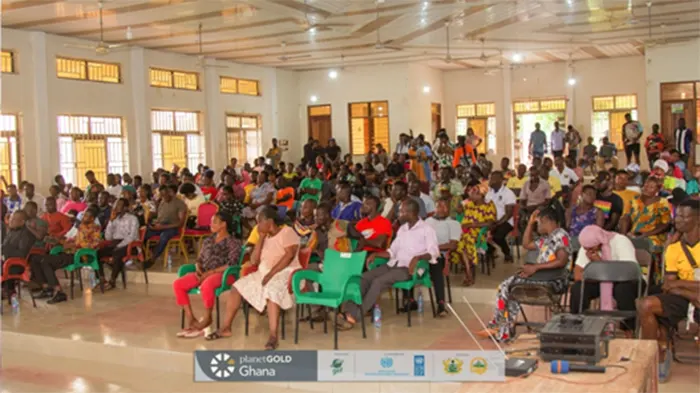Cross section of participants at the workshop
A lecturer at the University of Mines and Technology (UMaT) and expert in mercury-free gold processing technologies, Dr. Ishmael Quaicoe, has emphasised the urgent need to abandon mercury-based practices in mining due to their severe health and environmental risks.
He highlighted the detrimental effects of mercury use in artisanal small-scale mining on miners’ health and local ecosystems, stressing that these impacts cannot be overstated.
Dr. Quaicoe also underscored Ghana’s commitment to international agreements, including the Minamata Convention, which advocates for the gradual elimination of mercury in small-scale gold mining.
His remarks came during sensitisation workshops organised by the planetGOLD Ghana project, aimed at raising awareness about reducing mercury exposure among artisanal and small-scale gold mining (ASGM) actors in selected districts of the Ashanti and Central regions.
Dr. Quaicoe introduced several mercury-free alternatives for gold processing. He noted that adopting mercury-free technologies—such as gravimetric separation, flotation, and cyanidation—would provide safer and more sustainable methods for gold recovery.
These technologies could lead to lower long-term costs, potentially higher gold recovery rates, and improved health outcomes for miners.
However, Dr. Quaicoe acknowledged the challenges associated with adopting these technologies, including resistance to change and limited access to necessary equipment, which is not readily available.
Dr. Quaicoe mentioned that the University of Mines and Technology offers training and capacity-building programmes to facilitate the adoption of these safer methods.
He pointed out that other countries have successfully implemented mercury-free technologies, and called for increased support from the government, NGOs, and international organisations to expand these initiatives.
He urged miners to embrace these technologies, considering their long-term benefits for both health and the environment.
Project Coordinator for planetGOLD Ghana, Mr. Lovelace Sarpong, stated that the project aims to minimise the risks associated with mercury use in the ASGM sector by improving chemical management and eliminating pollution hazards while promoting financial inclusion and transitioning to a formal economy.
He added that the project seeks to strengthen national and jurisdictional capacity to enhance Ghana’s compliance with the Minamata Convention, aligning with national environmental policies and global platforms focused on mercury reduction, responsible supply chains, and mineral resource governance.
By Prince Fiifi Yorke


